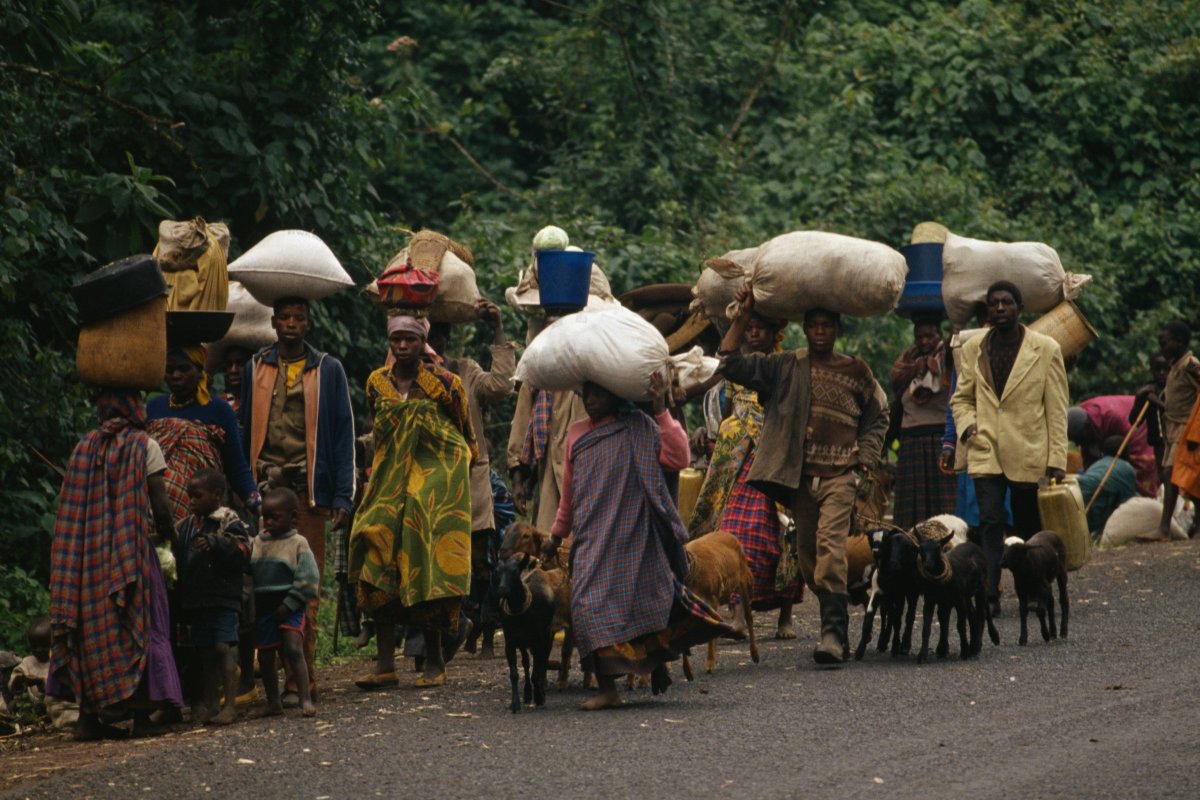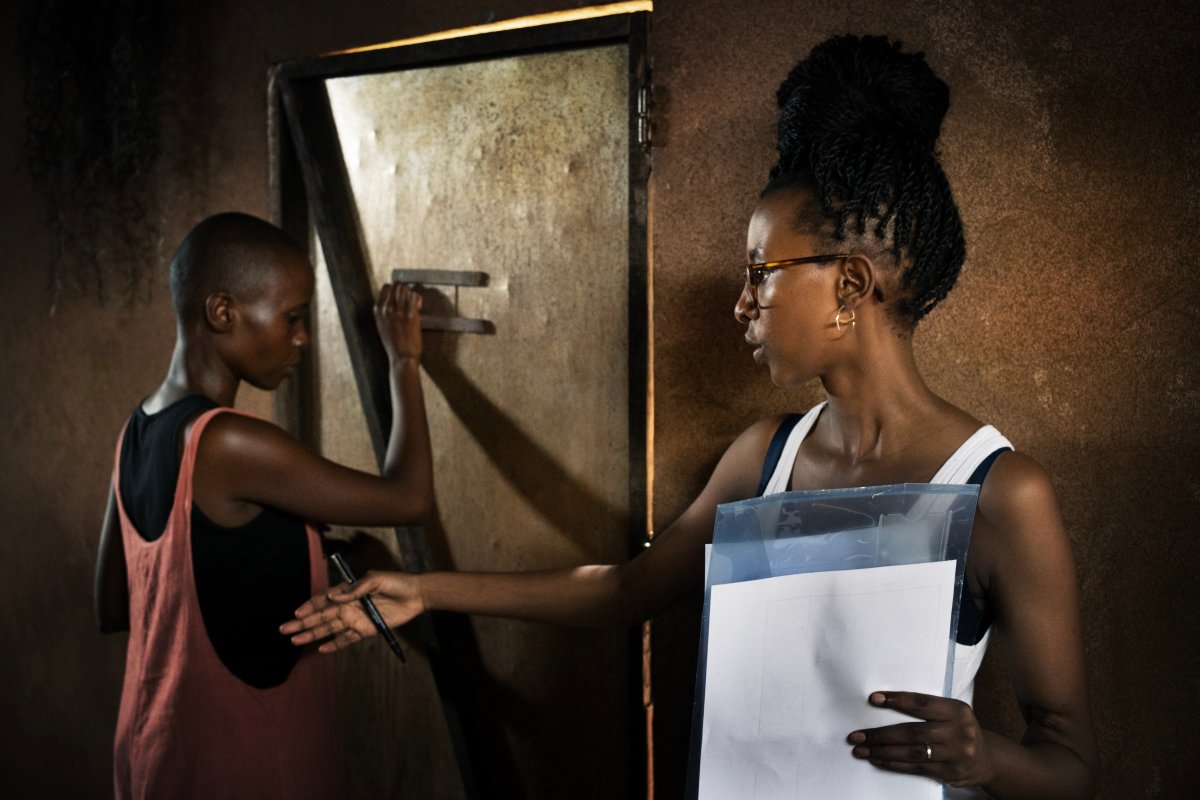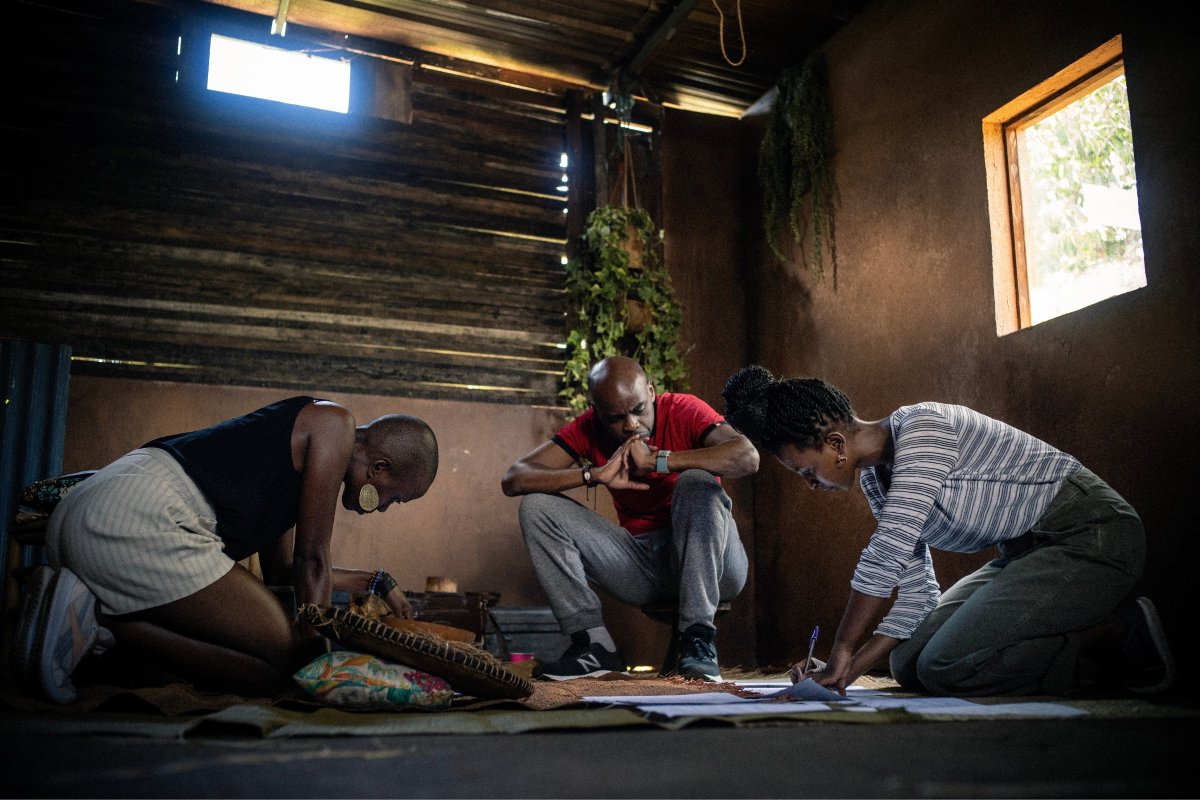Growing up in Kigali, Rwanda, we were the only Tutsi family on the street. I was the youngest of six children and we had a pretty decent life. My mom owned her own business and my dad worked for the customs office. We played with local neighborhood kids, but there was always this sense of othering towards our family.
I was born in the early 1990s, at the beginning of the Rwandan Civil War that cumulated in the genocide of the Tutsi people by the Hutu ethnic majority in 1994, so there were was always an undercurrent of tension throughout our lives. One of my earliest memories, when I was around 3 years old, was my nursery teacher saying: "Tutsis on one side, Hutus on the corner."
From an early age, my mother taught us to lie if we were asked if we were Hutu or Tutsi. I knew we were different, but I don't think I fully understood what was going
on at the time. I remember my dad coming home battered and bruised and knowing it was because he was Tutsi.

I remember listening to music from a Tutsi artist who was in exile at the time. Her songs were part of the Rwandan Patriotic Front's fundraising efforts and somehow my family had her tapes. One of my great memories is locking the doors, closing the curtains and sitting in the living room listening to her whole album. We knew it was dangerous, but those little acts of rebellion were really exciting.
The genocide of my people began when I was 5 years old. Over the period of 100 days Hutu forces set out to exterminate Tutsis. My family was attacked by local police, and in a way, that was lucky. The other option was being attacked by militia, who hacked you to death in front of your family, using rudimentary tools.
To me, that's one of the most harrowing things about the genocide, how long it can take to kill a person.
Our family was lined up and shot at. People survived, others died, but in a way, that was a quick and merciful death. My father, three siblings and my cousins were killed.
During the genocide I lost most of my dad's side of the family. My grandparents had five siblings who had families of their own. They all perished. I had not realized at the time how prevalent rape was as a war tool, but luckily none of the women in my family experienced that.
Myself, my mother, my sister and my brother made it out alive. My mother decided that we should split up to increase our chances of survival, so I moved with her to the countryside to live with an aunt.
Our aunt had a double identity as a Hutu—you could buy a fake ID if you had the money and knew the right person to bribe—so she was able to hide us. When things got really bad and they searched her house, she would hide us in a hole in the ground. My mother and I lived there for the duration of the genocide, and we survived.
The next three years were really difficult for my family, especially for my mother. She went from having a husband and children, living fairly comfortably—obviously she had faced oppression, but they had found a way around the system—to just being on her own, having children to raise. She didn't have any capital to start any business.
It was an incredibly difficult time. It's hard to imagine what it feels like when a country is starting from scratch; a country without a medical system, without any infrastructure. My mother was only 35 and was dealing with a lot of trauma. Whenever I think about that period of time, that's what I think about most—my mom's grief.

Many people assume that after the genocide Rwanda was a peaceful place, but that's just not true. There were still tensions in the country and it never felt like the war was really over. In 1997, when I was 8 years old, my school was attacked by militia forces of the former genocide regime, who were trying to kidnap the children of politicians.
I survived the attack, but in my mind and my mother's mind, this was confirmation that Rwanda was still a dangerous place to be. We moved to Uganda for eight years and later to the United Kingdom. At the time, I wasn't very happy about moving so far from home, but I knew that my mom made the decision because she wanted a different life, and she couldn't bear the thought of losing her children again.
Moving to the U.K. at 14 was a culture shock in every conceivable way. I arrived in April and it took me a long time to adjust to the cold. At that time, I had only been speaking English for four years, and I didn't fully understand it.
I was very lucky to attend a great school in Dulwich in south London. In many ways, it was a haven for me. It offered me lots of support to figure out who I was, figure out my place in British society and figure out what it is like to be British. It's where I found English literature and buried my nose in books—reading was my true refuge as a teenager. Luckily, my school wasn't the kind of place where you needed to desperately try to be cool.
While my school was exactly what I needed at that time, my teenage years were rough. I didn't really deal with much from my past, I essentially blocked it out. I thought: I'm in a new country, I'll adopt a different personality. I lost my accent somewhat; I was desperate to leave behind my Rwandan identity.
At that time, the popular movie Hotel Rwanda, about a hotel manager who sheltered more than 1,000 during the genocide, had been released and every time I said, "I'm from Rwanda," they would reference that movie, and I just did not want to address that. So, throughout my teenage years, I told people I was from Burundi, because nobody would ask me any follow up questions. I lived as Burundian for a long time.

My mother and I definitely felt the absence of my brother and sister, who because they're much older decided they didn't want to come to the U.K. and start from scratch. I believe that is part of the legacies of genocide with my family, it split us from being a very close knit family in one location to being spread across the world.
I think it's a life long journey to reclaim one's identity, because once you think you figure it out, often you realize you've changed again. You're constantly evolving as a human, which I feel is a good thing.
I knew I couldn't say I was Burundian forever and by the time I reached 25 years old I had met my now husband, who had questions I didn't have answers to. He was desperate to see where I'm from and I decided I needed to go back as well. I thought: "I need to make peace with where I've come from, I can't hide from this anymore."
I took a trip back to Kigali, where the journey to making my BAFTA nominated short film, Bazigaga, began. I had been working in the entertainment industry since graduating university and during my visit back to Rwanda in my twenties I came across the story of a woman called Zula Karimbi.
She was a traditional healer, a normal woman in her community, but when genocide broke out, she decided to use her reputation to convince people she was a witch doctor. Her performance was so convincing that Hutu forces really were scared of her and left her to it. She saved over 200 people by hiding them in her house and I thought it was just the most extraordinary thing I've ever heard.
She was a middle-aged woman who didn't have any weapons, she lived in a tiny hut, and Hutu forces were camped right in front of her house. All they had to do was open the door, that's all. I was blown away by her courage and intrigued with why the people who were killing Tutsis were happy to kill people in churches, burn them in churches, but were afraid of the curses of a traditional woman, like a witch doctor.
I was pulled along that thread and I began researching more about traditional beliefs and the role of Christianity, the role of religion in the genocide and in ideology, which I just found fascinating.
I've always thought that if I were to tell the story of Rwanda, I would love to tell it from a female perspective. In my opinion, a lot of cinema that depicts African society in terms of war and women can be quite degrading. I often find it condescending, so to find a female, African heroine as my protagonist was amazing.
It took us a few years to get all the funding together, part of the reason was because I wanted the film to be in Kinyarwanda, the native language, and with a mainly Rwandan cast. It was really important to me that the movie be as authentic as possible.
Finally, in 2020, we got all the funding we needed and it ended up being a co-production with France and Belgium and the U.K. We filmed in the middle of the pandemic on Réunion Island, which is just off the coast of Madagascar. We got exterior shots from Rwanda and it was a four day shoot, which was fairly intense. I had my 10-month-old child with me, which was quite the experience, but it was a fantastic shoot.
Seeing the movie in its entirety was amazing. I remember showing friends of mine and the first thing they said was: "Oh, I understand it without any subtitles." We are so used to seeing films like this not made by Rwandans, certainly not made for Rwandans to understand, so even something as simple as speaking with the right accent is so important in terms of representing people authentically.
To me, although it's a story about a woman in the middle of the tragedy, in this tragedy, I feel like it's a story about courage. It is a story about sacrifice. And ultimately, it's a story that challenges us to find the best in humanity, because this is the best of humanity represented.
Jo Ingabire Moys is a writer and director and co-founder of the Ishami Foundation, a charity that fights discrimination against refugees and immigrants. BAZIGAGA is her directorial debut.
All views expressed in this article are the author's own.
As told to Newsweek's My Turn associate editor, Monica Greep.
Do you have a unique experience or personal story to share? Email the My Turn team at myturn@newsweek.com
Uncommon Knowledge
Newsweek is committed to challenging conventional wisdom and finding connections in the search for common ground.
Newsweek is committed to challenging conventional wisdom and finding connections in the search for common ground.
About the writer
To read how Newsweek uses AI as a newsroom tool, Click here.






